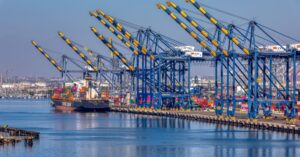The freight market is facing unprecedented volatility. Carrying over from an ugly 2023, the picture hasn’t improved substantially this year. As of February, there were 8.6% fewer freight brokerages than a year earlier, according to data from the Federal Motor Carrier Safety Administration (FMCSA), a metric that has been in negative territory since July.
While 2023 was marked by high-profile exits of Convoy, Transplus, and Surge Transportation, there were layoffs, bankruptcies, and closures throughout the year.
This is troubling for the broader economy as a leading indicator. High interest rates, inflation, and fluctuating consumer demand have all combined to reduce freight volumes. Economic pressures are affecting everything from shipping costs to supply chain efficiency.
All of this has impacted brokers who secure transportation capacity on behalf of shippers, while carriers struggle to find enough loads to stay in business. The tender rejection rate from FreightWaves SONAR, which leans toward contracted hauling in reefer and dry van, was at 4.79% in early June, with 5%–7% a healthy rate in non-holiday periods. When the rejection rate is so low, it indicates carriers can’t afford to pass up many loads and remain viable.
In this uncertain environment, shippers need to de-risk their transportation plans by coming up with strategies designed to guard against volatility. One way to do so is to seek out brokers with a reputation for delivering guaranteed capacity in any market.
The State of the Freight Market
The industry is still mired in a stubborn two-year slump in freight demand. The Cass Freight Index for April was down 1.6% sequentially and down 4% year-over-year. The index reading of 1.098 showed that freight volume was only 0.1% higher than when the index started in 1990.
The Logistics Managers Index (LMI) showed transportation prices in expansion territory in May, at 57.8, slightly ahead of capacity, which fell 4 points to 57.3. While this might seem positive, the report noted that price expansions over the prior six months had always been temporary. “The freight recession that began in mid-2022 will not be over until transportation prices are consistent above transportation capacity,” the report said.
In 2023, more than 1,500 freight brokers ceased operations, marking the first contraction in four years. That large number points to broader economic challenges, including reduced freight volumes due to lower consumer demand, and increased operating costs. Carriers of course were also severely impacted: an estimated 88,000 trucking firms closed in 2023, representing 12% of the approximately 750,000 registered with the Department of Transportation.
This mass exodus also signaled intense competition among many smaller, less financially stable freight brokers, all chasing disappearing volumes and operating on thin margins. To that point, Brush Pass Research said in April there were 27,000 active brokers in the U.S., but the top 1,000 control 88% of the industry’s revenue.
Freight brokerages often struggle to adjust their cost structures quickly in response to sudden market shifts, as has occurred in the past two years. The scenario likely went something like this: Fixed costs like salaries, office leases, and technology investments were not easily reduced without significant business disruption.
As freight demand suddenly dropped, inflexible costs led to financial strain, and a domino effect ensued as expenses could not be reduced fast enough to prevent mounting losses. Reserves were depleted, making it difficult to sustain operations. As the financial pressure intensified, many brokerages were forced to close, unable to weather the storm due an inability to rapidly scale back expenses. And there was no plan B revenue source.
Not all states were impacted equally. Georgia and Florida, for example, while having fewer freight brokers than California and Texas, lost more freight brokers in both absolute and percentage terms. This could be due to differing economic, regulatory, and infrastructure factors.
As freight brokers play such a critical role in connecting shippers with carriers, this large exit is affecting service levels and the ability to procure both contracted and spot capacity. Fewer brokers also means less competition, a sure recipe for higher fees and overall transportation costs.
Impact on Shippers When a Brokerage Closes
Shippers who had been relying on brokers that went out of business face the prospect of service disruptions. They either need to find new brokers quickly or deal with carriers directly, which can be time-consuming and challenging for someone not familiar with the process. Smaller shippers also lack the volume leverage of a broker partner, as well as the negotiation savvy borne of experience.
When a brokerage closes, shippers face several challenges that could take months, if not longer, to resolve. The immediate impact is that shipments in transit may be delayed or left without carriers, disrupting business operations. Finding alternative brokers or carriers on short notice often comes at a premium in the spot market.
This also leads to capacity shortages, especially during peak seasons. The supply chain is disrupted, causing delays and potential losses. As noted, administrative burdens also increase because shippers must now manage the transition to new brokers or carriers.
The adjustment period that naturally occurs with new broker and/or carrier relationships can adversely affect service quality. It will take time for them to understand the specific requirements of each shipper, an environment that can lead to poor communications and inconsistent service. These disruptions can negatively impact a shipper’s ability to meet customer demands and maintain operational efficiency, highlighting the critical role brokers play in ensuring smooth logistics and transportation operations.
Strategies to Mitigate Risks in a Volatile Brokerage Landscape
Given the current volatility in freight transportation and brokerage, shippers should plan to adopt strategies that focus on mitigating risk by focusing on strong partnerships, planning, and collaboration.
Work with a Resilient Broker
Even though market conditions dictated a serious thinning of the broker herd, there are still reasons why many of them failed. Freight brokers that were seriously under-capitalized, lacked a solid carrier network, or had popped up to seize an opportunity in the boom times of the pandemic, were bound to fail. The brutal economics of a prolonged freight recession only exacerbated the situation and hastened their demise.
Choose brokers with strong financial health, a solid client base (preferably with companies in your sector), and a proven track record of surviving past downturns. As an analyst noted the other day, there are always going to be challenging markets, and extended boom times are rare.
Service reliability is a huge factor. Ask to speak to some clients in your space to hear about their experiences. How long have they been working with the broker? What’s their track record in meeting SLAs?
A collaborative approach is also a key success factor in working with a freight broker. You need a team that prioritizes open communication with shippers so you stay informed on each load they manage on your behalf. In addition to negotiating transportation rates, look for a broker that ensures safe, timely delivery by coordinating logistics, including scheduling pick-ups and deliveries, and keeping all parties informed. They should also have the ability to track shipments, provide updates, and address issues that arise.
Technology Stack A Critical Factor
Finding a freight broker that has made significant investments in their tech stack is a critical consideration for shippers. Especially important is the ability to provide real-time tracking, exceptions management, and market forecasting.
Advanced tools enable precise tracking of shipments in transit, improving inventory management, production planning and cash management. This also assists with exception management, as the system will trigger alerts to stakeholders when any deviation from route or schedule is detected. Swift action can then be taken to mitigate issues.
An experienced, tech-forward freight broker can also leverage their platform and expertise to analyze real-time and historical data, developing market forecasts that aid in planning.
All of this provides a high level of accountability between shipper and broker, creating an atmosphere of transparency and trust on which to build a long-term partnership.
Find a Partner With Sector Expertise
Finding a freight broker with experience in your industry is important for several reasons. In general, a deep understanding of the unique industry challenges will help them provide tailored services.
In terms of compliance with industry regulations and standards, the broker’s sector knowledge reduces the risk of delays due to violations, improving supply chain reliability. An experienced broker can also leverage this knowledge to negotiate better carrier rates and optimize routes. All of this ultimately enhances operational efficiency and improves performance metrics.
Regularly Monitor Broker Performance
Shippers can monitor their freight broker’s performance in several ways to ensure they are meeting the service terms. Make sure you can track KPIs such as on-time percentage, freight cost per mile, and load acceptance rate.
The broker should be able to provide regular performance reports, including details on shipments, delays, and issues encountered. Get feedback from carriers on their experience, including communication, timely payment and overall satisfaction, and from other shippers about on-time performance and the condition of goods shipped.
Track shipments using a transportation management system (TMS) to evaluate the broker’s efficiency and reliability. Conduct periodic audits of the broker’s service quality. Review documentation, regulatory compliance, and adherence to SLAs.
Contingency Planning A Must
Develop and maintain contingency plans, such as creating a list of backup carriers and drafting emergency procedures. This type of effective planning helps ensure operational continuity, minimizing the impact of any disruptions.
On the broker side, look for a company with a demonstrable track record of assisting shippers with contingency planning when exceptions arise. Their deep expertise and extensive network contacts can help you quickly pivot to an alternative plan, minimizing any delays and added costs.
COGISTICS Transportation Helps Shippers Navigate Ever-Changing Market Conditions
In any market condition, it’s important that your transportation strategy includes securing the right freight broker relationships, to ensure adequate capacity and build in contingency. But this is never more true when a sustained freight recession causes volatility and uncertainty.
COGISTICS Transportation, with a logistics heritage dating back to the 1980s, has the sector expertise and best-in-class technology to provide superior freight brokerage that exceeds expectations. Service reliability even through lean times is a hallmark of every client engagement.
Engaging with an established logistics partner like COGISTICS Transportation greatly reduces your risk of costly delays. Its streamlined process, strong carrier network, and real-time tracking give you peace of mind that your shipment is being handled properly, every time. Get in touch today to learn more.




